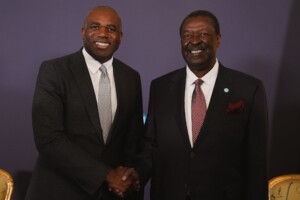PM Hamdok: ‘Anybody responsible for atrocities in Sudan will be held to account, including Hemeti’
In an interview with the US National Public Radio (NPR), Prime Minister Abdallah Hamdok stated that “anybody” responsible for atrocities in Sudan must be held accountable. When pressed by the interviewer whether that includes deputy chairman of the Sovereign Council and commander of the notorious Rapid Support Forces militia, Lt Gen Mohamed Hamdan ‘Hemeti’, Hamdok replied: “Absolutely.”
 Prime Minister Abdallah Hamdok (File photo)
Prime Minister Abdallah Hamdok (File photo)
In an interview with the US National Public Radio (NPR), Prime Minister Abdallah Hamdok stated that “anybody” responsible for atrocities in Sudan must be held accountable. When pressed by the interviewer whether that includes deputy chairman of the Sovereign Council and commander of the notorious Rapid Support Forces militia, Lt Gen Mohamed Hamdan ‘Hemeti’, Hamdok replied: “Absolutely.”
According to Prime Minister Hamdok what the Sudanese government is doing now is “a Sudan model of transition”. “It has the potential of addressing all these challenges, and working together. In terms of the atrocities that were committed on the 3 of June, we have established a well-distinguished, reputable committee that is going to investigate this. And I think we will get to the bottom of that.”
Al Bashir
Questioned whether the ousted dictator Omar Al Bashir should be extradited to the International Criminal Court Hamdok said that Al Bashir will be tried in Sudan for everything he has done. “Our bottom line and yardstick is that justice has to be seen served to the maximum satisfaction of the victims. They are the ones who will guide us in this process, and we are happy to do anything that will satisfy them. The current case against Al Bashir is a starting point. It will eventually go from toppling an elected government (in 1989), and all the way through the Darfur genocide and other atrocities. It's not only Darfur. There are many atrocities committed in so many parts of the country. We're working on establishing judiciary structures that are independent and credible.”
PM Hamdok indicates in the interview that the change in Sudan surprised everybody, including political activists. “I couldn't have imagined it a year ago. It was primarily led by young people, women, who were creating this momentous change. It's just exciting.”
Morality laws
The Hamdok government recently repealed the so-called morality laws, which restricted women's freedom of movement and regulated the type of clothing they were allowed to wear. Hamdok says his government will continue on this road. “We are happy and ready to abolish dehumanizing laws that, for example, allow flogging as a legal form of punishment. The sky is the limit for our ambition in observing the human rights of our people.”
Women
On the role of women in his government Hamdok had this to say: “When we started putting together the transitional government structures, we had in mind that our women should not be represented because we are giving them a gift or handout, but because it is a just and well-deserved representation. They were part of this change.”
List of state sponsors of terrorism
An important goals of Hamdok’s visit to Washington is to try to persuade the US government to take Sudan off the list of state sponsors of terrorism. Hamdok: “The delisting of Sudan holds the key to so many processes. We inherited a mounting debt close to 60 billion dollar. We will not be able to start any process of debt restructuring if we were not delisted, because of the accompanying sanctions that come with being listed as a sponsor of terrorism. The immediate challenge we are facing in this transition is the shortage of commodities, the very high inflation, which is in double digits. All this is creating very serious hardships to the ordinary citizens on the streets. Investment from decent companies will create jobs. Also, if we get it right in Sudan, this will have an extremely strategic impact and effect in the entire region.”
Listen to the interview at the NPR website.
Radio Dabanga’s editorial independence means that we can continue to provide factual updates about political developments to Sudanese and international actors, educate people about how to avoid outbreaks of infectious diseases, and provide a window to the world for those in all corners of Sudan. Support Radio Dabanga for as little as €2.50, the equivalent of a cup of coffee.












 and then
and then